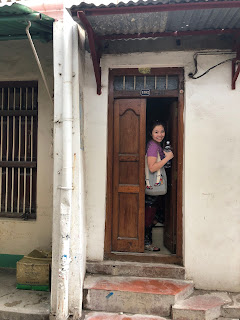I’m giving
up TV, social media, and cell phone games for two months.
Why do this?
I work 6-7
days a week, 50-60 hours a week. I come home exhausted, and my first
inclination is to lie down and watch TV. I get comfortable, pull out my phone,
and play a cell phone game while the comforting computer screen flashes with
images of TV shows or movies or Youtube videos.
An hour goes by. Then another.
I force myself to get up to eat dinner, and then watch more TV. I look at the
clock and see it’s 10:30 pm. I have some time before bed, I tell myself; I can
use this time to work on the novel, or study Chinese, or paint, or clean my
room, or do anything productive.
But I don’t.
Despite the hours I have spent ‘relaxing,’ I don’t feel any more energized than
when I first came home. If anything, I feel MORE drained than before. So I just
keep watching TV until it’s bed time. Another evening wasted. I tell myself
that I’ll be more productive tomorrow, basking in the comfort of my obvious lie.
So I decided
to make a change.
The rules
This
challenge is in effect from October 28th - January 1st.
1. I cannot
watch any movie or TV show.
2. I cannot
play any cell phone game, EXCEPT for chess. (I love chess.)
3. I cannot
watch Youtube.
4. I cannot
go on Facebook. (I do allow myself to post important things to Facebook, but I
cannot scroll through the feed and look at everyone else’s posts.)
Do you consider
yourself an addict of electronic stimulation?
I spoke with
a family member about this, who used to have a problem with drugs. And it made
me realize that yes, I am an addict, and I need to start viewing my behavior as
that of an addict. It’s not harmless fun to come home and watch TV every day,
especially when this is behavior that I want to change, but struggle with. This
routine sucks time and energy out of my life, and it may not seem harmful in
the day to day minutia of life, but to step back and look at the time lost over
years- decades… this behavior has dramatic, real world consequences, and it has
cost me a lot.
In the ONE month
that I have given up TV/social media/video games, I’ve written a 50,000 word
novel, started taking boxing classes, and committed to exercising twice a day-
WHILE working an extremely demanding job.
What have I failed
to accomplish over the last decade because I was devoting my life to TV? What
novels did I not write? What classes did I not take? What languages did I not
learn? What friends did I not make? What books did I not read? What
life-changing experiences did I miss out on because I was watching TV?
What
sacrifices has my little addiction cost me?
Is this life style
sustainable?
I don’t know
if I can keep this up. I miss Youtube. I miss TED talks, and videos that discuss
writing, and comic books, and science. I want to go on Youtube and learn more
about boxing form and technique.
I also miss my
favorite TV shows. Game of thrones. Vikings. Handmaid’s Tale. Atlanta. Cosmos.
So will I
continue my old life style in January? I don’t know. The idea of wasting all my
free time over TV and cell phone games scares me.
So I plan to
use this time of asceticism to figure who I want to be when the challenge is
over.
Final thoughts?
I’ve tried
several times to limit my time with TV, cell phone games, and social media, but
I always fail. I’ve tried no TV in the A.M., only from 12 P.M. to 11:59 P.M.,
but I couldn’t commit. I tried no TV on Saturday and Sunday, but I couldn’t
commit. I tried giving myself a schedule- one hour of TV per day; I couldn’t commit. This has been the LONGEST I've ever gone without TV, video games, and social media.
It’s an
amazing, horrifying feeling to know that you control the ship that is your
life. Every time you get an urge to feed your addiction, whether it’s
television, or over-eating, or online shopping, you are holding the
self-destruct button that is your future. You are making the decision not to
push it.
Note of
common sense: By calling myself an addict for watching too much television, I
don’t mean to equate my plight with those who suffer crippling chemical
dependencies like heroin or alcohol. I honestly struggle with my challenge, so
I cannot even imagine what it’s like to go through a REAL addiction like meth or gambling.





























